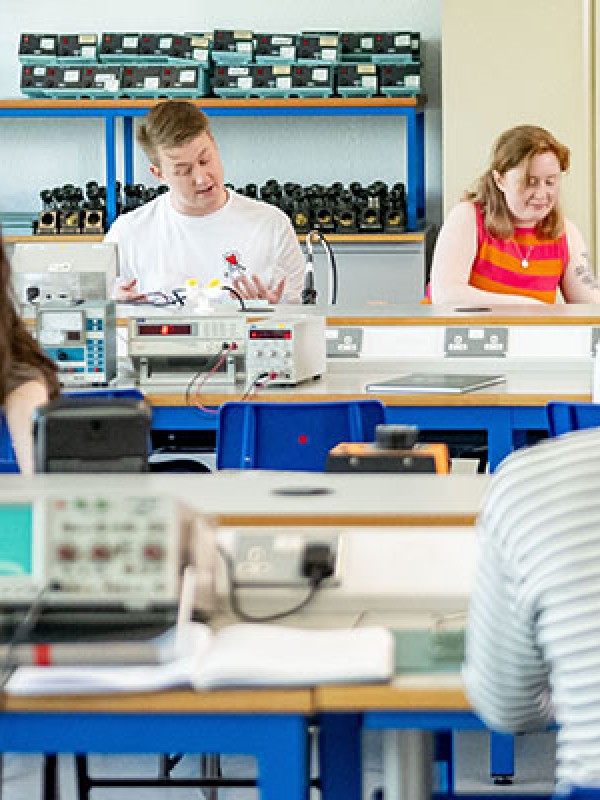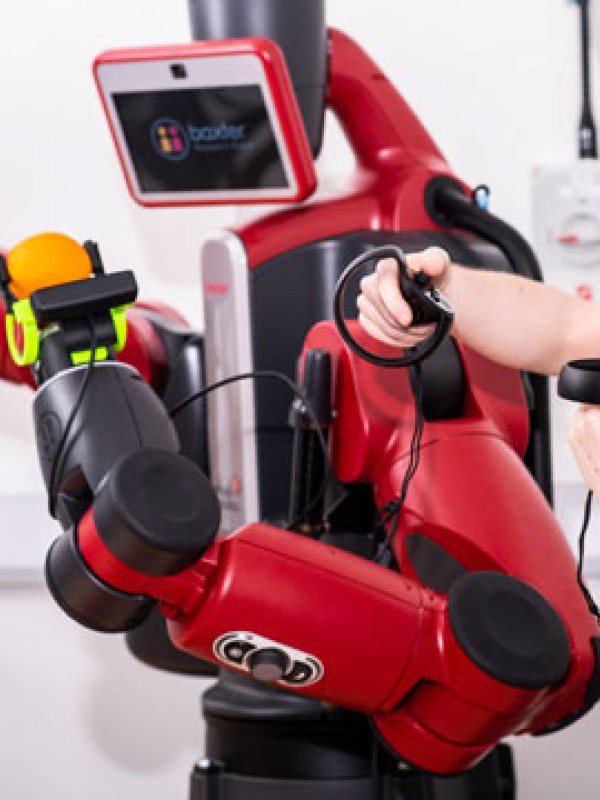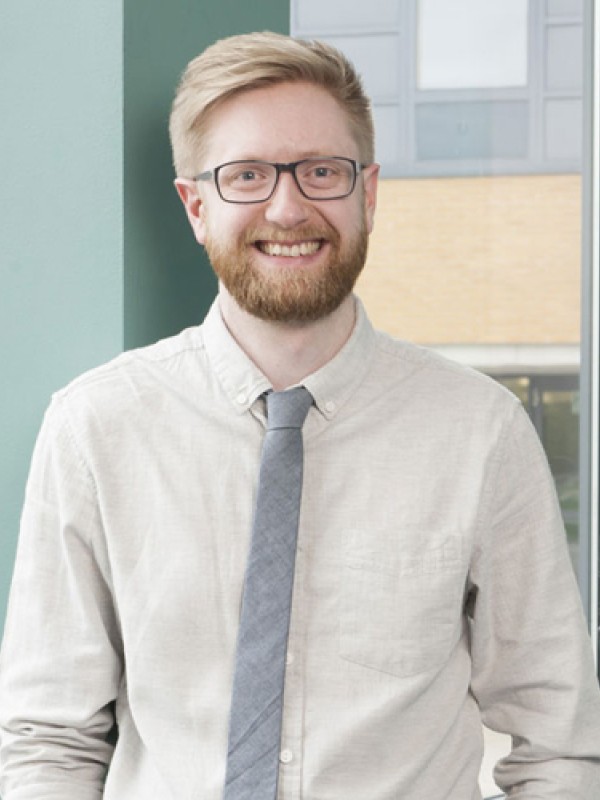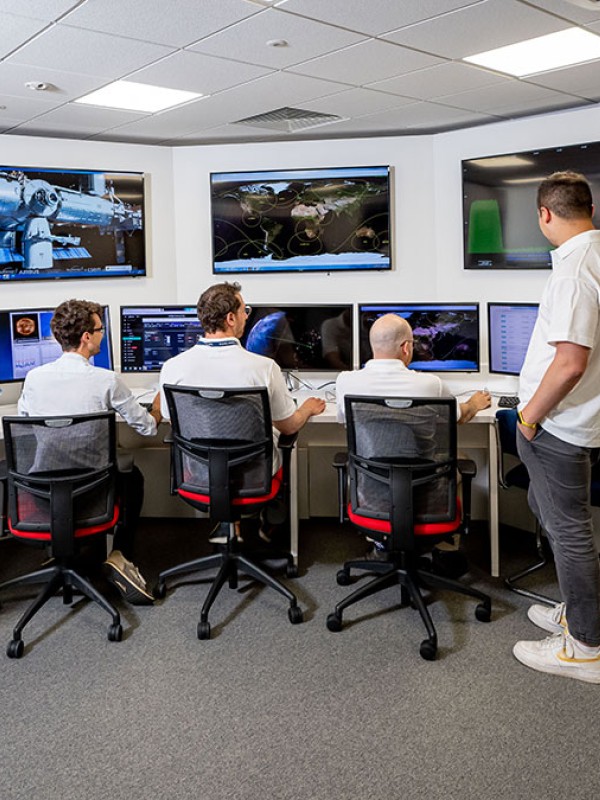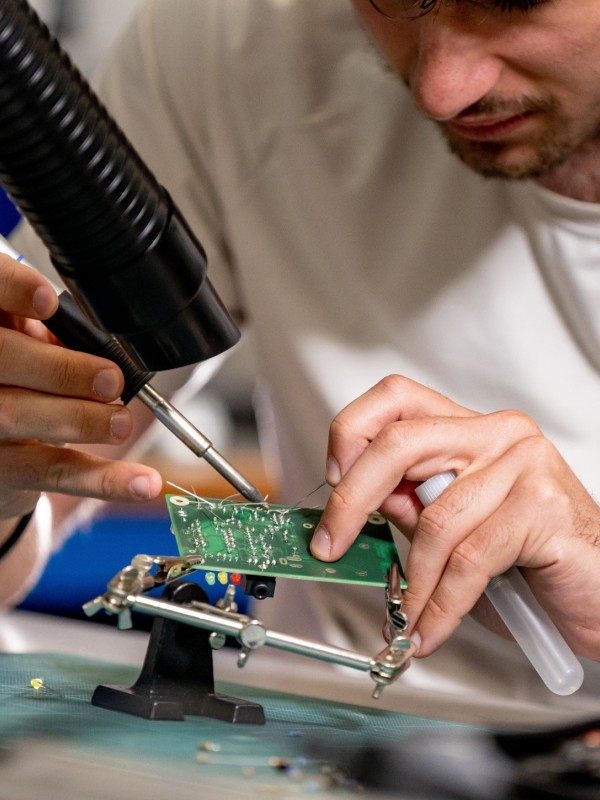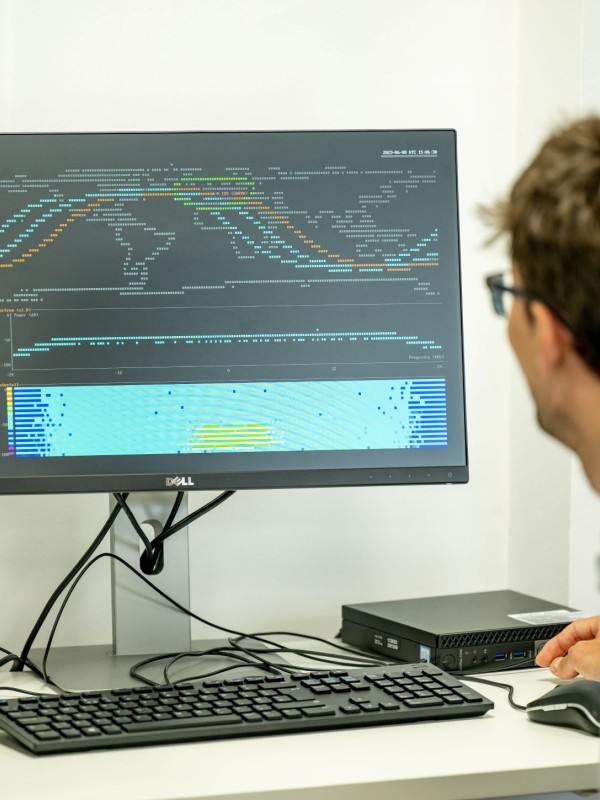
- Astronautics and Space Engineering
MSc — 2026 entry Astronautics and Space Engineering
Our Astronautics and Space Engineering MSc degree provides students with the specialised knowledge and skills needed to design, build, and operate space systems for a wide range of applications, from satellite communications and Earth observation to exploration missions and space tourism.
4,138+ people have created a bespoke digital prospectus
Why choose
this course?
The night sky presents us with the idea of infinity, and advances in space engineering give us the opportunity to go further and explore more than ever before.
At Surrey, we pioneered sophisticated ‘micro-satellites’ in the 1980s. Since then, we’ve maintained a programme of building entire satellites, performing mission planning, working with international launch agencies and providing in-orbit operations. This activity keeps us at the forefront of the space revolution.
With Surrey Space Centre on our campus, and our strategic partnership agreements with Surrey Satellite Technology Ltd and Airbus, we are part of the lifeblood of the UK’s industrial space sector.
What you will study
Our MSc is designed to give you the specialist multidisciplinary knowledge and skills required for a career working with space technologies. You’ll have access to all aspects of the design and delivery of spacecraft and payloads.
We are the only UK academic institution that develops, builds and operates complete space missions – from initial concept to hardware design, manufacturing and testing to in-orbit operations. All this is controlled by our own spacecraft mission operation ground station at Surrey Space Centre. Because of this, you’ll have the chance to gain first-hand experience of real space missions and how this relates to the taught modules.
Technical characteristics of the course
On this MSc, we aim to provide you with an in-depth understanding of the design of space missions using satellites. You will apply the knowledge you gain in theory and in practice at a high level, exploring the specialist areas of space physics, mechanics, orbits and space-propulsion systems, as well as the system and electronic design of spacecraft.
This is a multidisciplinary course and projects are often closely associated with ongoing space research projects carried out by Surrey Satellite Technology Ltd. This is a large local company that builds satellites commercially and carries out industrially-sponsored research.
Research
At Surrey Space Centre, we carry out applied research most relevant to space engineering, ranging from whole-mission developments and execution to scientific investigations into specific technologies that support their deployment in the space industry.
Many student projects are conducted in collaboration with industry and focus on real applications, bridging the gap between university education and the end product.
If you’re studying this course full-time, you’ll study eight modules across the year – four in each semester.
You will work on your project full-time during the summer period for approximately two-and-a-half months, and prior to that, during semester time, you will work on the initial stages of the project part-time and complete an interim report. This means that if you begin your course in February, you will complete your project in between the two semesters, and if you begin your course in September, you will complete your project after the two semesters.
You can also study this course part-time, taking between two and five years. You can study between two and six modules each year and the length taken to complete the MSc depends on how many modules you choose. We recommend part-time students work on their project in their final year of study when all eight modules have either been completed or are near completion.
The structure of our programmes follows clear educational aims that are tailored to each programme. These are all outlined in the programme specifications which include further details such as the learning outcomes:
Modules
Modules listed are indicative, reflecting the information available at the time of publication. Modules are subject to teaching availability, student demand and/or class size caps.
The University operates a credit framework for all taught programmes based on a 15-credit tariff, meaning all modules are comprised of multiples of 15 credits.
Course options
Year 1
Semester 1
Compulsory
Expected prior learning: Students are expected to be familiar with the module contents of EEE1031, EEE1032, EEE2035 and equivalent. Students are also expected to be familiar with the basic principles of computer programming such as the writing of a function, for/while loops, if/else statements. It is helpful, but not essential, to have studied module EEE2043 – Space Engineering and Mission Design or to have equivalent learning. Student Journey: This module applies Engineering Mathematics concepts introduced in year 1 and 2 to the motion of objects in space. Combined with EEEM009 - Advanced Guidance Navigation & Control, which builds upon EEE3039 concepts to present students with a more in-depth overview of space-related hardware and software, EEE3039 aims at laying out the foundation for describing, predicting, and controlling the motion of objects in Space (both in terms of spacecraft position and orientation with respect to suitable reference frames). Module purpose: This module gives a hands-on approach to mission analysis and develops mathematical descriptions of the natural orbital and rotational motions of spacecraft. Material is delivered through a series of lectures, group problem solving and assessed assignments. The application to mission design is explored through group work and coding assignments.
View full module detailsExpected prior learning: Good background in physics including forces and motion, heat and light, and electricity and magnetism as might have been acquired at A/AS level or International Baccalaureate Physics. It is also useful to have some knowledge of typical space missions: BEng/MEng students might have acquired this through the EEE2043 – Space Engineering & Mission Design module. Module purpose: This is a key module for students interested in becoming space systems engineers, or in working in a related field. It introduces the student to the key principles and techniques of spacecraft systems design, through real-world examples. The student journey: For those students on the undergraduate “space” pathways, the compulsory Level 6 modules: EEE3040 Space Engineering and EEE3039 Space Dynamics and Missions, build upon the Level 5 Module EEE2043 Space Engineering and Mission Design, but provide a more detailed examination of the material. For students coming in on the MSc space pathway, EE3040 provides a first introduction to space systems design – therefore no prior knowledge of space is expected, however, a good understanding of basic physics and mathematics (to “A” level or first year undergraduate level or equivalent) is assumed. These modules, together, provide the background and context for the detailed individual Level 7 modules concerning different aspects, systems and applications of spacecraft: e.g. EEEM044 RF Systems and Circuit Design; EEM031 Satellite Communications Fundamentals; EEEM033 Satellite Remote Sensing; EEEM059 Space Avionics;.EEEM009 Advanced Guidance, Navigation and Control; EEEM032 Advanced Satellite Communications Techniques; EEEM012 Launch Vehicles and Propulsion; EEEM M057 Space Environment and Protection and EEEM049 Spacecraft Structures and Mechanisms. Students may choose their own selection from these advanced Level 7 modules, according to their interests or future career choices.
View full module detailsOptional
Expected prior/parallel learning: BEng-level understanding of digital telecommunications systems. MEng students might have partly acquired this through study of EEE3006 – Digital Communications. Module purpose: Satellite communications are an important component of modern telecommunication systems. This module provides the student with an overall understanding of satellite communication systems, technologies and techniques and equips him/her with the design tools to enter employment in the sector. The main goal of this module is to design a satellite communication link to fix or mobile users given a specified quality of service (QoS). To do so, one needs to take into account both telecommunication and satellite related parameters. In this module, you will learn about the satellite payload and how it operates, what is in the earth station and what are the characteristics of the satellite to earth link. In particular, we clearly state the differences in design compared to the terrestrial communication systems We also study in some details the modern satellite networks and constellations. [EEE3006]: This module uses several techniques addressed in digital communications module such as coding and modulation. [EEEM032]: This module is a prerequisite for the advanced satellite communication techniques. [EEEM009],[EEEM059]: Even though other satellite applications such as earth observation or satellites for navigation and positioning are not addressed in this module, however, all such application will eventually need to stablish a communication line with earth. In this sense, this module is closely related to modules on space avionics and navigation, guidance and control.
View full module detailsExpected prior learning: None specifically advised. Module purpose: Earth and planetary observation with remote sensing data is playing a key role in the present understanding of natural phenomena, prevention of disasters, resources monitoring, comprehension of origins of life. Through a series of lectures, seminars, open discussions and “thinking breaks” in class, the module aims to give an introduction to the scientific principles of remote sensing – both passive and active – as carried out by spacecraft. Remote sensing is discussed in terms of instrumentation, missions, products and applications. IMPORTANT: The Second assessment pattern (Written Exam) is only applicable to the MSc Short Course Students.
View full module detailsIMPORTANT: The second assessment pattern is only applicable to the MSc Short Course Students Expected prior learning: EEE3033 – RF and Microwave Fundamentals, or equivalent learning. Module purpose: Advanced communications systems and radar operate at RF and microwave frequencies. The design principles and circuit operation, underlying these systems, are quite different from those of electronics used in signal processing at baseband frequencies. This module will cover the key elements of RF and microwave system design as well as analysis concepts for a range of commonly used active circuits, including: oscillators, frequency synthesisers, amplifiers and mixers. The module will also cover the circuit design and operation of non-linear devices used in active circuits together with deployment considerations. This module will include and build on many of the concepts studied in EEE3033 RF and Microwave Fundamentals and address further advanced features of non linear RF devices and system optimisation. It is complementary to EEEM064 Microwave Design Techniques and also EEEM006 Antennas and Propagation.
View full module detailsNearly all flows encountered in engineering practice are turbulent, so it is critical that engineers have an understanding of the complexities of turbulence and the difficulties in modelling it for design purposes. This module therefore builds on earlier modules in aerodynamics, providing an introduction to the fundamental physics of turbulent flows and existing approximate and semi-empirical techniques for modelling turbulence in CFD. The module also provides an overview of experimental techniques for characterizing turbulence, and the importance of experimental validation.
View full module detailsAs engineers it is important to avoid structure or component failure due to overloading or excessive deflection, and stress analysis is the way of assessing such conditions. This module extends the stress analysis delivered in earlier years to cover advanced topics to provide the student with a comprehensive range of skills. This includes increased complexity due to component shape (non-symmetric sections, plates) and stresses caused by loading conditions not previously considered in detail (pressure, torsion and shear forces). Many structures, components and forms of loading are too complex to obtain exact solutions for. In such cases Energy methods can often be used to provide approximate solutions, enabling the engineer to carry out structural assessment. The module shows how energy methods can be used to find the response of structural systems to static loads. A key element of the module is problem solving, thus developing students' resourcefulness. Efficient mechanical design, covering a full range of engineering materials, facilitates lightweighting, and in this way supports a sustainability agenda.
View full module detailsSemester 2
Core
This module is aimed at forming essential professional skills and competences in research and innovation for master level students studying in programmes relating to computer science and/or electronic engineering. It will therefore serve as an important initial module towards planning and executing the dissertation project through learning about literature reviewing and research methodologies. Furthermore, it will facilitate team building skills through identifying individual strengths and exercising capability through group design work. This experience will also make the student aware of the challenges of working effectively with other people.
View full module detailsOptional
Expected prior learning: EEE3039 SPACE DYNAMICS AND MISSIONS and EEE3040 SPACE SYSTEM DESIGN, or equivalent learning. General prior knowledge of basic control theory is recommended. Module purpose: This module provides advanced understanding of the dynamics of satellites and of methods for controlling satellite motion.
View full module detailsExpected prior learning: None specifically advised. Module purpose: This is a key module for students interested in becoming space systems engineers, or in working in a related field. It introduces the student to the key principles and techniques of launch vehicles and propulsion. Through a series of lectures, exercises and case studies, the module aims to give an understanding on the fundamentals of Launch Vehicle design and propulsion techniques for spacecraft travel.
View full module detailsExpected prior/parallel learning: This module covers advanced topics on satellite communications and networks, following the Satellite Communication fundamentals (EEEM031). An alternate module containing suitable prior learning is, Space System Design (EEE3040). Module purpose: This module covers advanced topics on satellite communications and networks. These networks are an important part of global information infrastructure providing broadcasting, mobile and broadband services to millions of homes and offices as well as disaster relieves and emergency communications services.
View full module detailsExpected prior learning: Knowledge equivalent to BEng/BSc in physics or engineering, or equivalent learning. Module purpose: Engineers and scientists in the space industry need a sound appreciation of the hostile and challenging space environment which includes electromagnetic and particle radiation, space weather, plasmas, ultra-high vacuum, particulates (inc. debris) and thermal extremes. This module provides a comprehensive and detailed understanding of the space environment and its impacts in an engineering context and goes into more detail than is possible in the ‘Space System Design’ module: it is especially complementary with ‘Space Avionics’ which provides further methods to protect microelectronics and computers in particular. Through a series of lectures and exercises, and making use of numerous global digital resources including global space environment models, space weather data streams, and international tools for calculations of effects and impacts, describes the impacts on engineering systems (especially to electronics and materials) and how to protect against them. This in turn enables students to design and create reliable space infrastructure leading to the sustainable and economic use of space in the long term by minimising space debris and avoiding wasted resources. In order to illustrate the industrial and employment perspective, realistic examples and exercises based on past scenarios are studied in detail also use is made of real-time space weather events as they develop as well as the forecasts provided via various global digital sources. Guest lectures by specialist practitioners in the field, for example, from the European Space Agency, Airbus, SSTL and OHB are normally provided. Student journey The module follows on naturally from the ‘Space System Design’ module which necessarily can give only a brief summary of the space environment but does put in context the broad range of missions, orbits and environments that can be encountered and summarises top-level impacts. EEEM057 looks in considerably more detail at the space environment and especially those aspects relevant to the performance and reliability of space-electronics and -avionics and protection measures. For these reasons the module is especially complementary with the ‘Space Avionics’ module, part of which looks at the design of avionics and on-board computers and further techniques to mitigate radiation impacts.
View full module detailsExpected Prior Learning: Module EEE3040 Space Systems Design, or equivalent module. Module Purpose: Through a series of lectures and a design assignment, the module aims to give an introduction to the engineering design principles, requirements and solutions for satellite avionics. This module builds on from many Electronic Engineering modules at undergraduate level in the topics of RF/Communications (EEE3033), Processor Design (EEE3027), and C coding Software (EEE1035 and EEE2047).
View full module detailsMachine Learning for Data Science incorporates a wide range of machine learning algorithms and data mining techniques, which can be applied to real-world problems and datasets with various characteristics to generate new insights and understanding. Through treatment of the principles and fundamental requirements for machine learning, example applications, and related exercises, this module will offer coverage of a range of contemporarily important and emergent machine learning algorithms. The module will provide for the means to critically evaluate, extend, and apply, appropriate techniques to datasets exemplifying specific characteristics in order to derive suitable and defensible results.
View full module detailsSpacecraft can range from small unmanned microsatellites through to large complex manned craft such as the international space station. Structure is the physical platform that supports and integrates sub-systems and payloads. As such, it is of fundamental importance for any spacecraft. Through a series of lectures and exercises, this module gives the students an understanding of the issues that must be addressed in the design and analysis of spacecraft structures and mechanisms.
View full module detailsSemester 1 & 2
Core
Expected prior learning: Appropriate background knowledge related to the project topic. Module purpose: This is an individual student project module giving each masters student an opportunity to gain realistic experience in developing a solution to a problem from its inception to a demonstrable result. It provides a framework as well as a vehicle for exercising all key aspects of project work, from project specification, through literature and technology research, leading to project planning, problem solving as well as design and implementation, culminating in performance assessment, project demonstration, and project evaluation. It also provides a scope for gaining practical experience interpersonal skills, use of IT, project management, project reporting and project presentation. The project can be either of engineering design nature or have a research flavour. This module is complementary to all other taught modules in order to apply the learning gained into undertaking an independent piece of research and/or development.
View full module detailsOptional modules for Year 1 - FHEQ Levels 6 and 7
Choose 2 of the optional modules in Semester 1
Choose 3 of the optional modules in Semester 2
Unstructured years
Semester 1
Compulsory
Expected prior learning: Students are expected to be familiar with the module contents of EEE1031, EEE1032, EEE2035 and equivalent. Students are also expected to be familiar with the basic principles of computer programming such as the writing of a function, for/while loops, if/else statements. It is helpful, but not essential, to have studied module EEE2043 – Space Engineering and Mission Design or to have equivalent learning. Student Journey: This module applies Engineering Mathematics concepts introduced in year 1 and 2 to the motion of objects in space. Combined with EEEM009 - Advanced Guidance Navigation & Control, which builds upon EEE3039 concepts to present students with a more in-depth overview of space-related hardware and software, EEE3039 aims at laying out the foundation for describing, predicting, and controlling the motion of objects in Space (both in terms of spacecraft position and orientation with respect to suitable reference frames). Module purpose: This module gives a hands-on approach to mission analysis and develops mathematical descriptions of the natural orbital and rotational motions of spacecraft. Material is delivered through a series of lectures, group problem solving and assessed assignments. The application to mission design is explored through group work and coding assignments.
View full module detailsExpected prior learning: Good background in physics including forces and motion, heat and light, and electricity and magnetism as might have been acquired at A/AS level or International Baccalaureate Physics. It is also useful to have some knowledge of typical space missions: BEng/MEng students might have acquired this through the EEE2043 – Space Engineering & Mission Design module. Module purpose: This is a key module for students interested in becoming space systems engineers, or in working in a related field. It introduces the student to the key principles and techniques of spacecraft systems design, through real-world examples. The student journey: For those students on the undergraduate “space” pathways, the compulsory Level 6 modules: EEE3040 Space Engineering and EEE3039 Space Dynamics and Missions, build upon the Level 5 Module EEE2043 Space Engineering and Mission Design, but provide a more detailed examination of the material. For students coming in on the MSc space pathway, EE3040 provides a first introduction to space systems design – therefore no prior knowledge of space is expected, however, a good understanding of basic physics and mathematics (to “A” level or first year undergraduate level or equivalent) is assumed. These modules, together, provide the background and context for the detailed individual Level 7 modules concerning different aspects, systems and applications of spacecraft: e.g. EEEM044 RF Systems and Circuit Design; EEM031 Satellite Communications Fundamentals; EEEM033 Satellite Remote Sensing; EEEM059 Space Avionics;.EEEM009 Advanced Guidance, Navigation and Control; EEEM032 Advanced Satellite Communications Techniques; EEEM012 Launch Vehicles and Propulsion; EEEM M057 Space Environment and Protection and EEEM049 Spacecraft Structures and Mechanisms. Students may choose their own selection from these advanced Level 7 modules, according to their interests or future career choices.
View full module detailsOptional
Expected prior/parallel learning: BEng-level understanding of digital telecommunications systems. MEng students might have partly acquired this through study of EEE3006 – Digital Communications. Module purpose: Satellite communications are an important component of modern telecommunication systems. This module provides the student with an overall understanding of satellite communication systems, technologies and techniques and equips him/her with the design tools to enter employment in the sector. The main goal of this module is to design a satellite communication link to fix or mobile users given a specified quality of service (QoS). To do so, one needs to take into account both telecommunication and satellite related parameters. In this module, you will learn about the satellite payload and how it operates, what is in the earth station and what are the characteristics of the satellite to earth link. In particular, we clearly state the differences in design compared to the terrestrial communication systems We also study in some details the modern satellite networks and constellations. [EEE3006]: This module uses several techniques addressed in digital communications module such as coding and modulation. [EEEM032]: This module is a prerequisite for the advanced satellite communication techniques. [EEEM009],[EEEM059]: Even though other satellite applications such as earth observation or satellites for navigation and positioning are not addressed in this module, however, all such application will eventually need to stablish a communication line with earth. In this sense, this module is closely related to modules on space avionics and navigation, guidance and control.
View full module detailsExpected prior learning: None specifically advised. Module purpose: Earth and planetary observation with remote sensing data is playing a key role in the present understanding of natural phenomena, prevention of disasters, resources monitoring, comprehension of origins of life. Through a series of lectures, seminars, open discussions and “thinking breaks” in class, the module aims to give an introduction to the scientific principles of remote sensing – both passive and active – as carried out by spacecraft. Remote sensing is discussed in terms of instrumentation, missions, products and applications. IMPORTANT: The Second assessment pattern (Written Exam) is only applicable to the MSc Short Course Students.
View full module detailsIMPORTANT: The second assessment pattern is only applicable to the MSc Short Course Students Expected prior learning: EEE3033 – RF and Microwave Fundamentals, or equivalent learning. Module purpose: Advanced communications systems and radar operate at RF and microwave frequencies. The design principles and circuit operation, underlying these systems, are quite different from those of electronics used in signal processing at baseband frequencies. This module will cover the key elements of RF and microwave system design as well as analysis concepts for a range of commonly used active circuits, including: oscillators, frequency synthesisers, amplifiers and mixers. The module will also cover the circuit design and operation of non-linear devices used in active circuits together with deployment considerations. This module will include and build on many of the concepts studied in EEE3033 RF and Microwave Fundamentals and address further advanced features of non linear RF devices and system optimisation. It is complementary to EEEM064 Microwave Design Techniques and also EEEM006 Antennas and Propagation.
View full module detailsNearly all flows encountered in engineering practice are turbulent, so it is critical that engineers have an understanding of the complexities of turbulence and the difficulties in modelling it for design purposes. This module therefore builds on earlier modules in aerodynamics, providing an introduction to the fundamental physics of turbulent flows and existing approximate and semi-empirical techniques for modelling turbulence in CFD. The module also provides an overview of experimental techniques for characterizing turbulence, and the importance of experimental validation.
View full module detailsAs engineers it is important to avoid structure or component failure due to overloading or excessive deflection, and stress analysis is the way of assessing such conditions. This module extends the stress analysis delivered in earlier years to cover advanced topics to provide the student with a comprehensive range of skills. This includes increased complexity due to component shape (non-symmetric sections, plates) and stresses caused by loading conditions not previously considered in detail (pressure, torsion and shear forces). Many structures, components and forms of loading are too complex to obtain exact solutions for. In such cases Energy methods can often be used to provide approximate solutions, enabling the engineer to carry out structural assessment. The module shows how energy methods can be used to find the response of structural systems to static loads. A key element of the module is problem solving, thus developing students' resourcefulness. Efficient mechanical design, covering a full range of engineering materials, facilitates lightweighting, and in this way supports a sustainability agenda.
View full module detailsSemester 2
Core
This module is aimed at forming essential professional skills and competences in research and innovation for master level students studying in programmes relating to computer science and/or electronic engineering. It will therefore serve as an important initial module towards planning and executing the dissertation project through learning about literature reviewing and research methodologies. Furthermore, it will facilitate team building skills through identifying individual strengths and exercising capability through group design work. This experience will also make the student aware of the challenges of working effectively with other people.
View full module detailsOptional
Expected prior learning: EEE3039 SPACE DYNAMICS AND MISSIONS and EEE3040 SPACE SYSTEM DESIGN, or equivalent learning. General prior knowledge of basic control theory is recommended. Module purpose: This module provides advanced understanding of the dynamics of satellites and of methods for controlling satellite motion.
View full module detailsExpected prior learning: None specifically advised. Module purpose: This is a key module for students interested in becoming space systems engineers, or in working in a related field. It introduces the student to the key principles and techniques of launch vehicles and propulsion. Through a series of lectures, exercises and case studies, the module aims to give an understanding on the fundamentals of Launch Vehicle design and propulsion techniques for spacecraft travel.
View full module detailsExpected prior/parallel learning: This module covers advanced topics on satellite communications and networks, following the Satellite Communication fundamentals (EEEM031). An alternate module containing suitable prior learning is, Space System Design (EEE3040). Module purpose: This module covers advanced topics on satellite communications and networks. These networks are an important part of global information infrastructure providing broadcasting, mobile and broadband services to millions of homes and offices as well as disaster relieves and emergency communications services.
View full module detailsExpected prior learning: Knowledge equivalent to BEng/BSc in physics or engineering, or equivalent learning. Module purpose: Engineers and scientists in the space industry need a sound appreciation of the hostile and challenging space environment which includes electromagnetic and particle radiation, space weather, plasmas, ultra-high vacuum, particulates (inc. debris) and thermal extremes. This module provides a comprehensive and detailed understanding of the space environment and its impacts in an engineering context and goes into more detail than is possible in the ‘Space System Design’ module: it is especially complementary with ‘Space Avionics’ which provides further methods to protect microelectronics and computers in particular. Through a series of lectures and exercises, and making use of numerous global digital resources including global space environment models, space weather data streams, and international tools for calculations of effects and impacts, describes the impacts on engineering systems (especially to electronics and materials) and how to protect against them. This in turn enables students to design and create reliable space infrastructure leading to the sustainable and economic use of space in the long term by minimising space debris and avoiding wasted resources. In order to illustrate the industrial and employment perspective, realistic examples and exercises based on past scenarios are studied in detail also use is made of real-time space weather events as they develop as well as the forecasts provided via various global digital sources. Guest lectures by specialist practitioners in the field, for example, from the European Space Agency, Airbus, SSTL and OHB are normally provided. Student journey The module follows on naturally from the ‘Space System Design’ module which necessarily can give only a brief summary of the space environment but does put in context the broad range of missions, orbits and environments that can be encountered and summarises top-level impacts. EEEM057 looks in considerably more detail at the space environment and especially those aspects relevant to the performance and reliability of space-electronics and -avionics and protection measures. For these reasons the module is especially complementary with the ‘Space Avionics’ module, part of which looks at the design of avionics and on-board computers and further techniques to mitigate radiation impacts.
View full module detailsExpected Prior Learning: Module EEE3040 Space Systems Design, or equivalent module. Module Purpose: Through a series of lectures and a design assignment, the module aims to give an introduction to the engineering design principles, requirements and solutions for satellite avionics. This module builds on from many Electronic Engineering modules at undergraduate level in the topics of RF/Communications (EEE3033), Processor Design (EEE3027), and C coding Software (EEE1035 and EEE2047).
View full module detailsMachine Learning for Data Science incorporates a wide range of machine learning algorithms and data mining techniques, which can be applied to real-world problems and datasets with various characteristics to generate new insights and understanding. Through treatment of the principles and fundamental requirements for machine learning, example applications, and related exercises, this module will offer coverage of a range of contemporarily important and emergent machine learning algorithms. The module will provide for the means to critically evaluate, extend, and apply, appropriate techniques to datasets exemplifying specific characteristics in order to derive suitable and defensible results.
View full module detailsSpacecraft can range from small unmanned microsatellites through to large complex manned craft such as the international space station. Structure is the physical platform that supports and integrates sub-systems and payloads. As such, it is of fundamental importance for any spacecraft. Through a series of lectures and exercises, this module gives the students an understanding of the issues that must be addressed in the design and analysis of spacecraft structures and mechanisms.
View full module detailsSemester 1 & 2
Core
Expected prior learning: Appropriate background knowledge related to the project topic. Module purpose: This is an individual student project module giving each masters student an opportunity to gain realistic experience in developing a solution to a problem from its inception to a demonstrable result. It provides a framework as well as a vehicle for exercising all key aspects of project work, from project specification, through literature and technology research, leading to project planning, problem solving as well as design and implementation, culminating in performance assessment, project demonstration, and project evaluation. It also provides a scope for gaining practical experience interpersonal skills, use of IT, project management, project reporting and project presentation. The project can be either of engineering design nature or have a research flavour. This module is complementary to all other taught modules in order to apply the learning gained into undertaking an independent piece of research and/or development.
View full module detailsGeneral course information
Contact hours
Contact hours can vary across our modules. Full details of the contact hours for each module are available from the University of Surrey's module catalogue. See the modules section for more information.
Timetable
New students will receive their personalised timetable during Welcome Week. In later semesters, at least one week before the start of the semester.
Scheduled teaching can take place on any day of the week (Monday – Friday), with part-time classes normally scheduled for one or two days. Wednesday afternoons tend to be for sports and cultural activities.
View our code of practice for the scheduling of teaching and assessment (PDF) for more information.
Location
This course is based at Stag Hill campus. Stag Hill is the University's main campus and where the majority of our courses are taught.
We offer careers information, advice and guidance to all students whilst studying with us, which is extended to our alumni for three years after leaving the University.
As a graduate of this course, you’ll be in high demand in the UK and European space industries, particularly as industry faces a critical need for graduates of electronic engineering-based disciplines. Students from Surrey Space Centre have gone on to work as engineers in radio frequency, instrumentation, imaging, computing, astrodynamics and propulsion.
Many graduates have been employed by Surrey Satellite Technology Ltd (which was founded by Surrey Space Centre) and Airbus. Other employers include:
- Astroscale
- European Space Agency
- Goonhilly Earth Station
- In-Space Missions
- QinetiQ
- Satellite Applications Catapult
- Thales
- UK Space Agency.
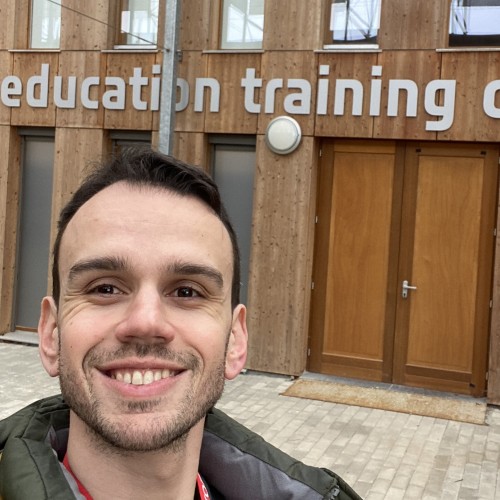
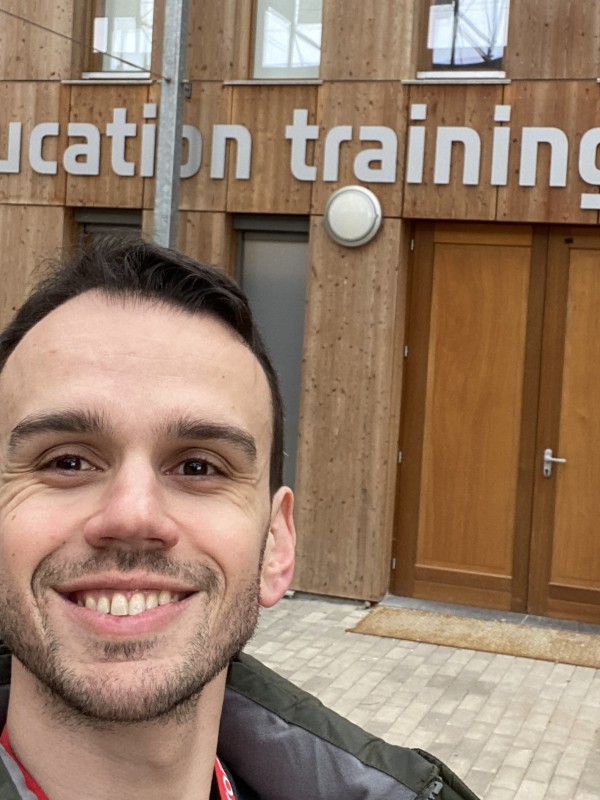
Charlie
Graduate - Space Engineering MSc
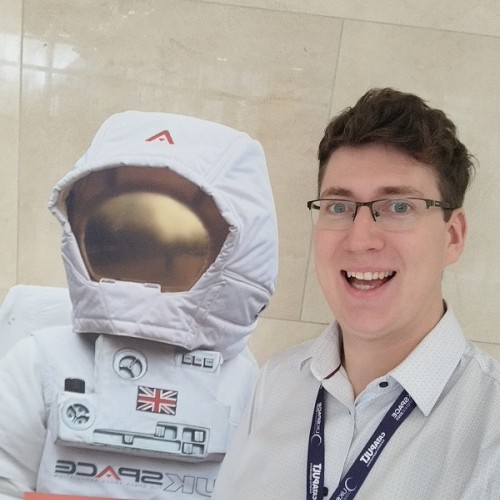
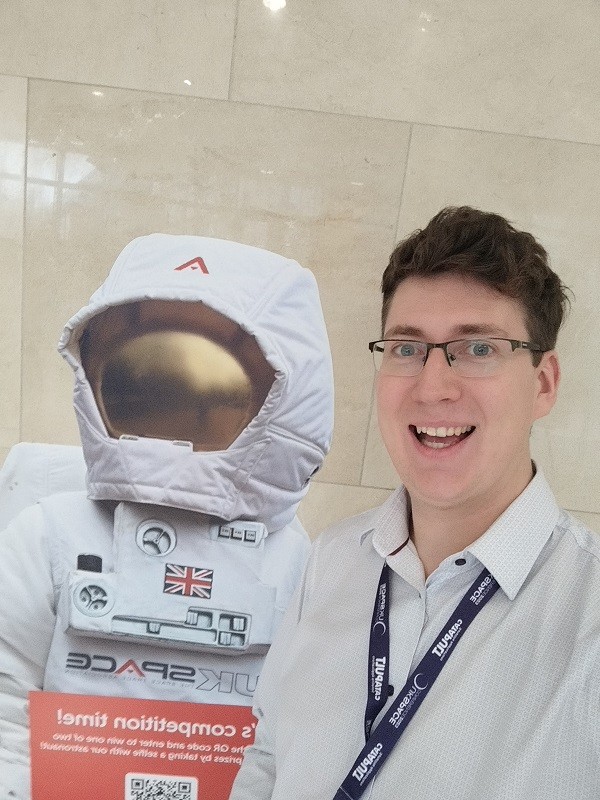
Oliver Cotton
Graduate - Space Engineering MSc
UK qualifications
A minimum of a 2:2 UK honours degree in aerospace engineering, communication engineering, computer engineering, electrical engineering, electrical and computer engineering, electronic engineering, information and communication technologies, mechanical engineering, physics or telecommunication engineering, or a recognised equivalent international qualification.
We'll also consider relevant work experience if you don't meet these requirements.
English language requirements
IELTS Academic: 6.5 overall with 6.0 in writing and 5.5 in each other element.
These are the English language qualifications and levels that we can accept.
If you do not currently meet the level required for your programme, we offer intensive pre-sessional English language courses, designed to take you to the level of English ability and skill required for your studies here.
Recognition of prior learning
We recognise that many students enter their course with valuable knowledge and skills developed through a range of ways.
If this applies to you, the recognition of prior learning process may mean you can join a course without the formal entry requirements, or at a point appropriate to your previous learning and experience.
There are restrictions for some courses and fees may be payable for certain claims. Please contact the Admissions team with any queries.
Scholarships and bursaries
Discover what scholarships and bursaries are available to support your studies.
Fees
Explore UKCISA’s website for more information if you are unsure whether you are a UK or overseas student. View the list of fees for all postgraduate courses.
September 2026 - Full-time - 1 year
- UK
- £12,900
- Overseas
- £25,900
September 2026 - Part-time - 5 years
- UK
- £1,500 per 15 credits
- Overseas
- £2,900 per 15 credits
- The dissertation module is charged as a 15-credit module for fee purposes
- These fees apply to the academic year 2026-27 only. Fees are reviewed annually, and tuition fees may increase for courses running over more than one year.
Payment schedule
- Students with Tuition Fee Loan: the Student Loans Company pay fees in line with their schedule (students on an unstructured self-paced part-time course are not eligible for a Tuition Fee Loan).
- Students without a Tuition Fee Loan: pay their fees either in full at the beginning of the programme or in two instalments as follows:
- 50% payable 10 days after the invoice date (expected to be October/November of each academic year)
- 50% in January of the same academic year.
- Students on part-time programmes where fees are paid on a modular basis: cannot pay fees by instalment.
- Sponsored students: must provide us with valid sponsorship information that covers the period of study.
The exact date(s) will be on invoices.
Additional costs
Costs may be incurred associated with the purchase of writing paper and associated stationery.
Funding
You may be able to borrow money to help pay your tuition fees and support you with your living costs. Find out more about postgraduate student finance.
Apply online
To apply online first select the course you'd like to apply for then log in.
Select your course
Choose the course option you wish to apply for.
Sign in
Create an account and sign into our application portal.
Please note that we may have to close applications before the stated deadline if we receive a high volume of suitable applications. We advise you to submit your application as soon as it is ready.
ApplyPlease note that we may have to close applications before the stated deadline if we receive a high volume of suitable applications. We advise you to submit your application as soon as it is ready.
ApplyAdmissions information
Once you apply, you can expect to hear back from us within 14 days. This might be with a decision on your application or with a request for further information.
Our code of practice for postgraduate taught admissions explains how the Admissions team considers applications and admits students. Read our postgraduate applicant guidance for more information on applying.
About the University of Surrey
Need more information?
Contact our Admissions team or talk to a current University of Surrey student online.
Terms and conditions
When you accept an offer to study at the University of Surrey, you are agreeing to follow our policies and procedures, student regulations, and terms and conditions.
We provide these terms and conditions at offer stage and are shown again at registration. You will be asked to accept these terms and conditions when you accept the offer made to you.
View our generic registration terms and conditions (PDF) for the 2025/26 academic year, as a guide on what to expect.
Disclaimer
This online prospectus has been published in advance of the academic year to which it applies.
Whilst we have done everything possible to ensure this information is accurate, some changes may happen between publishing and the start of the course.
It is important to check this website for any updates before you apply for a course with us. Read our full disclaimer.
